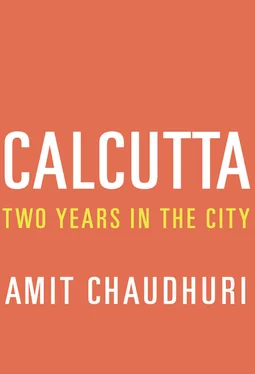I say the city isn’t at war with itself, but it is in a state of chafing conflict; the oppositional mode, where kaajer lok are concerned, is passive resistance. Strategy, subtle preparedness, and passive resistance are most in use during festivals. New festivals, paying homage to some unheard-of deity, are invented almost annually by the kaajer lok, in order to fob off the interminable and unrewarding cycle of work in a way that, at least in their own eyes, requires no rationale. Certain dubious middle-class festivals, such as jamai sasthi , when the demi-god and star and bane of Bengali society — the son-in-law — is fed and appeased by his wife’s parents, have grown in strength and consumerist fervour amongst some sections of the middle class after being appropriated by the free market and advertising; all this is being undone by the fact that jamai sasthi has now been smuggled out of its domain by the kaajer lok, and amplified for their own purposes. For days exceeding the single day of jamai sasthi, domestics fail to reappear, as they’re busy celebrating their own jamai sasthi — in an intricate, slow-paced way. Jamai sasthi, as a result, is more or less ruined for the middle class, because you can’t flatter and feed the son-in-law without the infrastructure and detail afforded by the hired help. Jamai sasthi, for the middle class now, is a week of dearth and abandonment.
Working people not only lack time for recreation and holidays, they also lack a proper notion of these things, and, at times, they’re indistinguishable to them from torture. For days they’ll go back to their home or desh or gram or village or family, the very place whose devastation drove them to Calcutta in the first place, be impeded during their return by a flood or a hurricane or a local election — anything from a natural calamity to a man-made disruption — and return to their employer’s apartment looking barely alive. No middle-class person would have undertaken this excursion — they’d simply have severed ties with their home town. Sometimes they insist on embarking on a self-flagellatory pilgrimage — my parents’ driver, Mahinder, did this: he went off to the famous Tarakeshwar temple, took a train from Howrah and got off at Sheoraphuli, collected water from the Ganga in two earthen pots which he hung from both ends of a pole resting sideways on his shoulders, then walked forty kilometres barefoot, as is customary, to the temple. He resumed work gaunt as a ghost; not only had he demolished the soles of his feet, he’d contracted gastroenteritis. Despite the awfulness of domestic work, most middle-class people would prefer domestic work to this kind of holiday. For the kaajer lok, kaaj or work is often terrible, but the escape from work sometimes seems more destructive. “Why did you do it?” I asked Mahinder, thinking divine reward might be the attraction. He suspected he was being mocked. “Oi — for some bhakti-wakti ”—“devotion and stuff.” “Any other reason?” Surely some good fortune? “No, just bhakti,” he said, sheepish. Should I believe him? To make that trek, but receive no windfall?
The Durga Pujas, the principal festivities of the year, is a period of abeyance and false stability, when passive resistance is applied cautiously, or in stealth. It’s akin to a card game; especially to playing poker. The kaajer lok, like everyone else, will receive notun bastra , or new clothes, from their employers, as part of the season’s distribution of goodwill. Even if they’ve come to hate their employers, poker-faced, the kaajer lok will play the game till the end of the Pujas, in the interests of the notun bastra, upon receiving which, and the moment they have a better offer from a potential employer, they will show their hand, rise, and leave. Today, notun bastra is passé, and domestics forgo it in favour of a palpable monetary incentive, a Puja bonus, which could be half their salary and thus worth substantially more than a new sari. The drivers, the crème de la crème of the hired help, of course receive a full month’s salary as Puja bonus. If, for some reason, you need to hire a driver or a domestic a month and a half leading up to the Pujas, you’ll be unsuccessful and have to do without, because the game has begun to be played, and no disaffected staff will reveal their cards and peremptorily move jobs before the bonus has exchanged hands.
The middle class feels it necessarily fares badly at this game of poker, despite holding its cards close to its chest. It also forgets that domestics — besides the fortnightly off-day — have no time for observances and anniversaries: they’re chopping onions in the kitchen on Independence Day; they’re swabbing the floor on Christmas Eve; they’re answering the telephone or doorbell on Republic Day.
Sometimes, when I’m in Norwich during the Pujas, I hear that some of the help have gone missing for a week, and the house is in disarray. The situation is worse with two old people at home, one of whom can no longer walk or talk properly. Helpless in Norwich, I open myself to a sense of penance at my selfishness and to my wife’s beleaguerment. This time, I’m in Calcutta, and nothing unexpected happens.
* * *
Just as there are neither permanent affiliations nor lasting enmities in politics, there are few in the employer — domestic relationship. This is true of our family. Employees who’ve thrown up their hands in despair and left have returned after months and resumed work; domestics whose services have been terminated because of some tiff or for repeatedly coming late to work, their final salaries paid, their signature or thumbprint received, are re-employed as if nothing had happened. For the employer, in the game of harvesting and hoarding staff that continues well after the Pujas, the returned domestic is a stopgap until a better alternative comes along. Since none does, the domestic becomes a long-term stopgap, her (it’s almost unfailingly her) incursion into territory she was recently exiled from tolerated in the knowledge that she’ll be discarded when the moment presents itself. The lapsed exile herself reunites with her past employers for being, for now, the least of necessary evils, and will forsake them as soon as it’s convenient.
Lakkhi is a case in point. She was our cook long ago, when she was fairly thin and could’ve been pretty but for her goofy expression. She’s quite a good cook in fact — not one of the great Bengali cooks of legend — but, given that culinary skills have receded irreversibly among the bhadralok and the kaajer lok, a good, competent technician. Her language is regally her own: she refers to Aquaguard, the water purifier installed in most kitchens, by her Bengali neologism, kuaghat , or, approximately, “the well on the river bank”; and to vinegar as bhinikal , which could be an esoteric kind of tap (given “kal” is “tap” in Bengali). She hates cooking, and, though she doesn’t say so in so many words, makes no bones about this; but, in a regrettable, circumstantial way, it’s what she’s spent most of her life doing. In the game of brinkmanship that is employment for the kaajer lok, you probably tend to forget such details. Her husband was a grocer; both a wholesaler and a vegetable-seller in Gariahat Market. Lakkhi left her job because she was arriving increasingly late, and tired, and couldn’t stand working in the kitchen any more. The kitchen, especially in April, May, June, and July, is an awful place; which is why cooks, despite being better paid among domestics, are a vanishing breed — the cook must combine the technician’s proficiency and a bit of artistic instinct with the archaic tenacity of a slave. Besides, it turned out Lakkhi was working somewhere early in the morning to supplement her income, though she denied it — which is why she was coming late, and, by the time she did, was quite disenchanted by the idea of cooking. Words had to be exchanged.
Читать дальше












